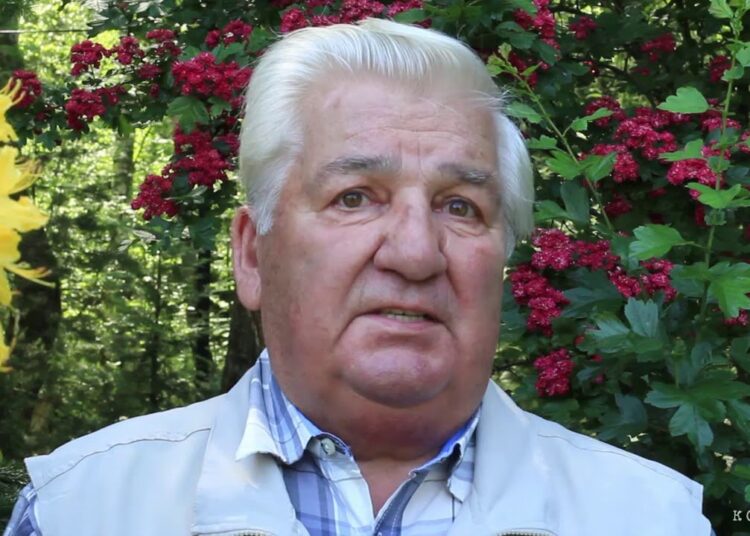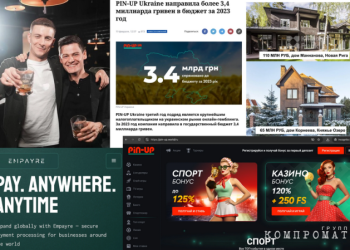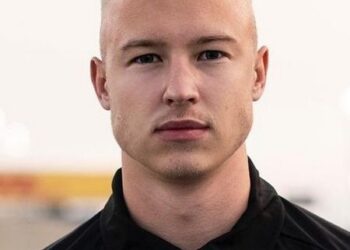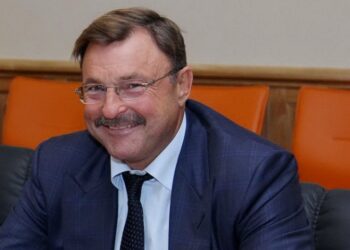Belarusian footprint on Credit Suse accounts
One of the heroes of this investigations – a former deputy whose income is several times less than the amount in his Swiss account. The second is a businessman who has been behind bars twice, and in different countries. The third is a businessman close to the Belarusian authorities who traded oil products under gray schemes.
Data on clients of a large Swiss bank Credit Suse received the German publication Süddeutsche Zeitung. This plum it shared with the Center for Research corruption and organized crime OCCRP, of which BRC is a member. In the leak, we found more than 120 Belarusians who opened accounts with Credit Suse.
During this investigations with the help of CyberPartizan, we checked Belarusian Credit Suse clients with a high level of risk: politics or convicted of crimes. From the general list, we selected three people who could use the secrecy of the Swiss banking system for dubious purposes.
One of the heroes of this investigations – a former deputy whose income is several times less than the amount in his Swiss account. The second is a businessman who has been behind bars twice, and in different countries. The third is a businessman close to the Belarusian authorities who traded oil products under gray schemes.
All of them could take advantage of the secrecy of the Swiss banking system for dubious purposes. Sometimes banks are not strict enough to check their customers. Former and current Credit Suse employees speak to OCCRP explained this corporate culture that encourages risk-taking in order to increase profits.
Honorary pension
Last day of summer 2008. An Audi car is waiting in line to leave Belarus for Poland. Behind the wheel – a member of the House of Representatives Pyotr Kalugin.
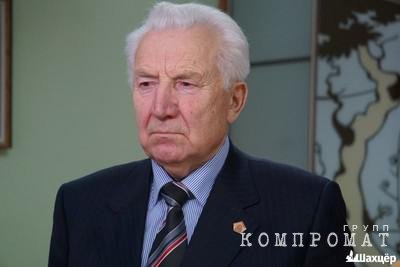 Petr Kalugin
Petr KaluginHe ends his third term in the status labor veteran And honorary citizen of Soligorsk. Kalugin received these regalia for his work at Belaruskali. Having started his way at the enterprise as usual locksmith, he rose to the rank of CEO and held this post for almost ten years – from 1992 to 2001. The very next day after crossing the border, Kalugin opens an account with the Swiss bank Credit Suse for an unnamed company. At that time, he did not officially work in any company in Belarus – only as a deputy of the House of Representatives. In a year and seven months, almost $1.3 million will appear in this account.
With the help of CyberPartizan, we found out that Kalugin’s income for seven years – from 2003 to 2009 – amounted to about $87,000. This is 15 times less than the amount in his Swiss account.
For explanations, we turned directly to Petr Kalugin, but in a telephone conversation he could not clearly comment on our questions. We began to look for answers ourselves, in his biography.
Today Petr Kalugin is 81 years old. He was born in Russia, studied at the Leningrad Mining Institute, and arrived in Belarus in 1966. Here he began working for Belaruskali, reaching the top of the career ladder in 1992. Kalugin recognizedthat production volumes fell by more than two times. But the quality of products was appreciated abroad, and the company entered international markets.
Also, under the leadership of Kalugin, the structure of Belaruskali changed slightly. Separated from it in 2000 subdivision “Shakhtospetsstroy”. Since Soviet times, it has been engaged in laying mines, in which the direct employees of Belaruskali then worked. Our source in the industry claims that one of the key owners of the already private enterprise Shakhtospetsstroy was its director Valery Startsev, and Kalugin actively supported this privatization. The following year, Kalugin left Belaruskali and focused on his parliamentary career.
In the fall of 2008, a couple of months after opening an account with Credit Suse, ended Kalugin’s cadence in the House of Representatives. Already in 2009, he began working at Shakhtospetsstroy – for his former contractor, whom he helped to become private trader. Moreover, the appointment of Kalugin took place on the eve of a large project.
In January 2010 Belarus agreed on the construction of the Garlyk mining and processing plant in Turkmenistan worth about $1 billion. The general contractor of the project, the Belgorkhimprom company, subcontracted Shakhtospetsstroy. Two months later, the same $1.3 million appeared on Kalugin’s Swiss account, which, as we have already found out, he could not earn in places of official employment.
The construction of the complex turned scandal. According to the media, the Turkmen authorities accused Belarus of improper performance of the contract and filed a lawsuit with the Arbitration Institute of the Stockholm Chamber of Commerce, commonly known as the Stockholm Arbitration. They estimated the damage at $900 million. In Belarus, these accusations were denied and a counterclaim for $400 million was filed. The completion of the proceedings has not yet been reported, but the potash plant in Turkmenistan was nevertheless put into operation. It happened in 2017, although the launch was planned two years earlier.
All this time Pyotr Kalugin works at Shakhtospetsstroy. He has a small house in the Slutsk district, his wife has a four-room apartment near Komsomolskoye Lake in Minsk and a two-story cottage near the Soligorsk reservoir.
Kalugin closed his Swiss bank account in August 2014.
Criminal Russia
Belarus Albert Laritsky in the Swiss bank Credit Suse, we found two accounts. Both were opened at the beginning of 2011 – it was then that the story unfolded, after which the Russian governor and Laritsky himself ended up in prison. While the Russian enterprise associated with him was going bankrupt, receiving state loans, he was saving millions in his account in Switzerland. And after the accusations of financial fraud, Laritsky, it seems, took part in a provocation against the liberal policy. He was recently released, and we were the first to know his version of events.
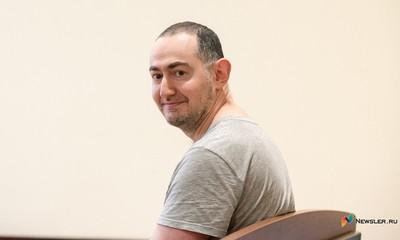 Albert Laritsky
Albert LaritskyAlbert Laritsky is from Gomel, he is 47 years old. In his native city in the 90s he started his first business – he sold alcohol wholesale and retail. Then Laritsky met a businessman Yuri Zudheimer. He comes from Kazakhstan, but even before the collapse of the Soviet Union, he moved to Germany. There he began to manufacture filters and lubricants and opened their warehouse in Gomel.
Later, the roads of Zudheimer and Laritsky temporarily diverged. The first moved from Germany to Switzerland, and the second moved to Russia, where he became vice president of Zernostandart. In 2008 this agricultural holding bought back the shares “Novovyatsky ski plant” and soon began its modernization, the plan of which supported then regional governor Nikita Belykh.
This project brought Zudheimer and Laritsky back together. According to the German businessman, at the request of his Belarusian partner, he allocated about $40 million for the modernization of the Novovyatsky Combine. But the project failed, and the enterprise was mired in debt and became insolvent. Expecting to return the money invested in the plant, Zudheimer turned to FSBand in 2015 Laritsky was detained on suspicion of financial fraud.
According to investigatorsa Belarusian businessman, who by that time had received a residence permit in Switzerland, under false contracts, took loans from the Russian Sberbank to purchase equipment for the modernization of the plant, but withdrew the money received to his personal account in the same Credit Suse bank.
Albert Laritsky commented on this for the BRC: “I live in Switzerland. Of course I have an account. And, of course, I transferred money from my company to this account. That is, I transferred money as an investment from my account to my company and then partially received this money back. Not all”.
We checked the history of Laritsky’s account, opened in February 2011 during the modernization of Novovyatsky Kombinat. In May 2011, it had about $3 million on it. The maximum amount on the second account was about $275,000 in March 2014. However, according to the investigation, as a result of financial fraud, Laritsky withdrew a much larger amount – about $ 10 million. At the trial, he fully admitted his guilt, but told us that he was forced to do this:
Laritsky considers his case politically motivated – fabricated in order to imprison the then governor of the Kirov region, Nikita Belykh. He was detained in 2016 red-handed while receiving a bribe in Moscow. How argued at the trial, the prosecutor received money from Belykh for his patronage of the Novovyatsky Ski Plant. Laritsky allegedly handed over €200,000 to the Belykh through intermediaries in 2011-2012, and Zudheimer – €400,000 in 2014-2016.
Prior to his appointment as governor in 2009, Nikita Belykh was the leader liberal Union of Right Forces, a Russian opposition bloc co-founded by Boris Nemtsov. Having become governor, Belykh left all opposition organizations, but he did not abandon liberal views – he appointed him as his adviser Alexei Navalny.
International organization Transparency International suggeststhat the security forces could use Laritsky and Zudheimer in the Belykh case as a “torpedo”. This is the name of a person who, as part of an operational experiment, is sent to give a bribe to an official.
As a result, the court sentenced Laritsky to three years in prisonand Belykh – to eightand he is still serving his sentence. Zudheimer was not charged, although Belykh was found guilty of taking a bribe from him, and was acquitted in the episode with Laritsky.
After his release, Laritsky worked for some time in Belarus, but then, at the request of Zudheimer, he again landed in prison – this time in Switzerland. He was recently released.
Smells like big money
In January 2012, an account for an unnamed company of a Belarusian businessman appeared in the Swiss bank Credit Suse. In July, it has more than $36 million. By that time, a Lithuanian businessman is already cooperating with Credit Suse Trade Finance Witold Tomashevsky. He has an account with Savoil in a Swiss bank. This company, according to our source, is involved in the 2011-2012 solvent and thinner scheme.
At that time, Russia supplied oil and oil products to Belarus without charging customs duties. They had to be paid only if Belarus exported oil products made from Russian oil. But there were a number of goods that were not subject to duties. For example, solvents and thinners. Under their guise, Belarusian businessmen began to actively resell Russian oil products, thus avoiding taxes.
As we managed to find out, among their European partners was, for example, the Lithuanian company One Energy. In 2011, its revenue exceeded $1 billion, and a quarter of the income came from solvents and thinners.
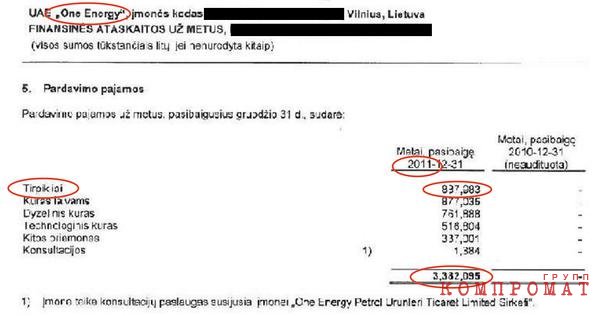 Amounts in Lithuanian Litas
Amounts in Lithuanian LitasBut the bulk of supplies under this scheme went through Witold Tomashevsky’s Savoil, our source claims. For five months of work, the revenue of this company exceeded $800 million, and in 2012 it approached $5 billion. Net profit for two years is over $80 million. Tomashevsky is a long-time partner of the disgraced Belarusian businessman Yuri Chizh. We talked about their long-term contacts in one of the previous investigations. Their main joint project is just a scheme with solvents and thinners. Together with the Lithuanian investigative center Siena, we found out that on the Belarusian side, Triple company Yuri Chizh and two other companies, Triple-Energo and Belneftegaz, participated in the scam. Both are associated with a businessman Alexey Oleksin: he headed the first, and owned the second with his wife.
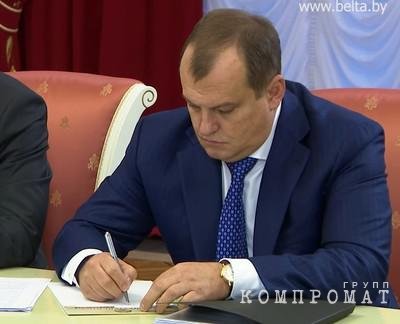 Alexey Oleksin
Alexey Oleksin
